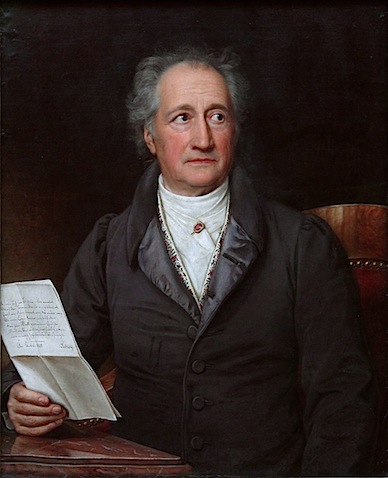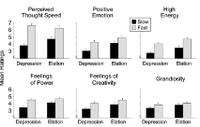The Thing WIth Feathers

“Hope is the thing with feathers that perches in the soul and sings the tune without words and never stops at all.”
–Emily Dickinson (New England Mystic Poet, 1830-1886)
Contented Living

“Nine requisites for contented living:
- Health enough to make work a pleasure.
- Wealth enough to support your needs.
- Strength enough to battle with difficulties and overcome them.
- Grace enough to confess your sins and forsake them.
- Patience enough to toil until some good is accomplished.
- Charity enough to see some goods in your neighbor.
- Love enough to move you to be useful and helpful to others.
- Faith enough to make real the things of God.
- Hope enough to remove all anxious fears concerning the future.”
–Johann Wolfgang Von Goethe (German Poet, Playwright and Philosopher, 1749-1832)
Just One Positive Thought

“It takes but one positive thought when given a chance to survive and thrive to overpower an entire army of negative thoughts.”
–Robert H. Schuller (American Protestant Minister and Writer, 1926-)
A Store of Goodly Thoughts

“We should lay up in our minds a store of goodly thoughts which will be a living treasure of knowledge always with us, and from which, at various times, and amidst all the shiftings of circumstances, we might be sure of drawing some comfort, guidance and sympathy.”
–Sir Arthur Helps (English Writer and Clerk of the British Privy Council, 1813-1875)
Overcoming Adversity

“He said not, “thou shalt not be troubled, thou shalt not be travailed, thou shalt not be diseased;” but He said, “Thou shalt not be overcome.”
–Julian of Norwich (English Mystic and Anchoress, 1342-c.1416)
Thinking Speed, Mood and Optimism

There’s a very interesting article at the Mixing Memory blog. It’s one of the blogs that I highlight in the “What I’m reading” section. The articles highlights some recent research by Emily Pronin and Dan Wegner from Princeton and Harvard respectively, entitled “Manic Thinking: Independent Effects of Thought Speed and Thought Content on Mood.”
It’s about an intriguing issue. People who have a manic illness have an acceleration of thinking processes together with elevated mood and energy level. Mania is also associated with racing thoughts grandiose or creative ideas, fast, uninterruptible speech, aimless pacing, irritability and an over-involvement in pleasurable activities, together with a loss of impulse control.
It may sound great, and initially people are often very happy to be manic. But after a while it can give way to exhaustion or the realization that some of their choices have been unwise. I once knew someone who was driving a brand new BMW – that she could definitely not afford – at over 120 miles an hour, the wrong way down Interstate 95. That’s when the police became involved, and they immediately realized that she was not a villain, but a very sick person who could have killed herself and a ton of other people.
The researchers they had a group of college undergraduates read a series of 58 emotion-inducing statements out loud, and to do it at either a fast or slow pace. The statements are emotionally neutral at the beginning and then become progressively more emotionally positive or negative. The idea is that reading a series of progressively more positive or negative statements will affect the reader’s mood. The letters in the statements were presented one at a time, either for 40 milliseconds per letter (“fast thinking” condition) or 170 milliseconds per letter (“slow thinking”). A pilot study indicated that the 40 milliseconds per letter reading time were about twice the normal reading speed for college undergraduates and 170 milliseconds were about half the normal speed. The time between statements also varied, with only 320 milliseconds between statements in the “fast condition” and 4 seconds between statements in the “slow condition.”
After reading all 58 statements, the participants were asked to answer a series of questions designed to assess their mood, energy level, feelings of power, creativity and inspiration. There were also questions to evaluate “grandiosity or inflated self-esteem,” together with their own perceptions of their speed of thought.
Subjects in the “fast thought” condition reported faster thought speeds than those in the “slower” condition. As predicted, faster thought speeds affected mood and mania-related feelings, participants in the fast thought condition reported being happier, had higher energy levels, experienced greater senses of power and creativity, and higher levels of grandiosity (though self-esteem did not differ between conditions). What is important, is that these effects were independent of the mood manipulation (positive or negative statements). Here is a graph from the paper presenting the effects of slow and fast thinking as a function of the type of sentence:

This study has some important implications. Thinking more quickly produces elevations of mood and self-perception that can smetimes be similar to those of very mild mania. I have seen this happen frequently when people have been up all night: the bright lights of morning and a few cups of coffee make them appear mildly manic. For a time they do in fact impress with their creativity and mastery not only of details, but of the “Big picture.” But as time goes on, much of their thinking turns out to be not altogether logical.
The study also raises the possibility that some manic symptoms may be produced by thinking. There is an old term from the psychoanalytic literature called “manic defense,” in which people use manic-like symptoms to protect themselves – or more accurately their ego structures – when under stress.
I have spent most of my life with people who think very quickly and accurately. Most also express themselves very well: both succinctly and fluently. But all have also known the importance of stopping for a while after a brainstorming session, so that we can see if our ideas have really born fruit, or if they just seemed a good idea at the time.
There is no question that moving and speaking more quickly can elevate our mood. It is no surprise that it has little impact on self-esteem. It is becoming more and more clear that self-esteem follows from genuine achievement. Boosting artificially is difficult, with one exception: when people have every reason to have decent self-esteem, but instead they keep feeling bad, as if they have a kind of leaky bucket as my friend the psychiatrist Stephen Preas calls it.
I remember an experiment in which an investigator was experimenting with ether. During one of his sessions he had a deeply felt mystical experience in which he was sure that he suddenly understood the whole of nature and reality. He immediately wrote it down so that he could show the world The Secret.
When he came back down to earth, he looked at what he had written, “The world is like a fish…”
“The world that we have created is a product of our thinking. It cannot be changed without changing our thinking.”
–Albert Einstein (German-born American Physicist and, in 1921, Winner of the Nobel Prize in Physics, 1879-1955
)
“Some would sooner die than think. In fact, they often do.”
–Bertrand Russell (Welsh Mathematician, Philosopher, Pacifist and, in 1950, Winner of the Nobel Prize in Literature, 1872-1970)
“Most people can’t think, most of the remainder won’t think, the small fraction who do think mostly can’t do it very well. The extremely tiny fraction who think regularly, accurately, creatively, and without self-delusion. In the long run, these are the only people who count.”
–Robert Heinlein (American Writer, 1907-1988)
Cicero’s Six Mistakes of Man

Today is traditionally taken to be the birthday of the great Roman lawyer, political figure, orator and philosopher Cicero, whose full name was Marcus Tullius Cicero. Nobody really knows the exact date of his birth, but for several centuries, January the 3rd it has been.
His life was extraordinarily successful by the standards of the day, and generations of school children learned some basic history and philosophy from him.
We also learned that success is subjective.
Over two thousand years ago he wrote about the “Six Mistakes of Man:”
- The delusion that personal gain is made by crushing others
- The tendency to worry about things that cannot be changed or corrected
- Insisting that a thing is impossible because we cannot accomplish it
- Refusing to set aside trivial preferences
- Neglecting development and refinement of the mind, and not acquiring the habit of reading and studying
- Attempting to compel others to believe and live as we do
Even after all this time, how much has really changed?
I urge you to think about those six and whether any of them are operating in your life. I often use “The Six” as a jumping off point in therapy or workshops: they often help us to focus on some of our false beliefs and perceptions.
And to celebrate his birthday, here are a few choice Cicero quotations from my own collection.
Enjoy and, perhaps, learn something from them.
“A liar is not believed even though he tells the truth.”
“A man’s own manner and character is what most becomes him.”
“A room without books is like a body without a soul.
“A youth of sensuality and intemperance delivers over a worn out body to old age.”
“Advice in old age is foolish; for what can be more absurd than to increase our provisions for the road the nearer we approach to our journey’s end.”
“All things are full of God.”
“As fire when thrown into water is cooled down and put out, so also a false accusation when brought against a man of the purest and holiest character, boils over and is at once dissipated, and vanishes and threats of heaven and sea, himself standing unmoved.”
“As I approve of a youth that has something of the old man in him, so I am no less pleased with an old man that has something of the youth. He that follows this rule may be old in body, but can never be so in mind.”
“As I give thought to the matter, I find four causes for the apparent misery of old age; first, it withdraws us from active accomplishments; second, it renders the body less powerful; third, it deprives us of almost all forms of enjoyment; fourth, it stands not far from death.”
“Avarice in old age is foolish; for what can be more absurd than to increase our provisions for the road the nearer we approach to our journey’s end.”
“Before beginning, plan carefully.”
“Before you trust a man, eat a peck of salt with him.”
“Brevity is a great charm of eloquence.”
“Brevity is the best recommendation of speech, whether in a senator or an orator.”
“By doubting we come at truth.”
“Cultivation to the mind is as necessary as food to the body.”
“Diseases of the soul are more dangerous and more numerous than those of the body.”
“Freedom suppressed and again regained bites with keener fangs than freedom never endangered.”
“Generosity should never exceed ability.”
“Gratitude is not only the greatest of virtues, but the parent of all the others.”
“Great is the power of habit. It teaches us to bear fatigue and to despise wounds and pain.”
“He only employs his passion who can make no use of his reason.”
“He who suffers, remembers.”
“If you would abolish avarice, you must abolish its mother, luxury.”
“In a disturbed mind, as in a body in the same state, health can not exist.”
“In everything satiety closely follows the greatest pleasures.”
“In nothing do men more nearly approach the gods than in giving health to men.”
“Inability to tell good from evil is the greatest worry of man’s life.”
“It is a shameful thing to be weary of inquiry when what we search for is excellent.”
“It is exercise alone that supports the spirits, and keeps the mind in vigor.”
“Justice is the crowning glory of the virtues.”
“Many wish not so much to be virtuous, as to seem to be.”
“Natural ability without education has more often raised a man to glory and virtue than education without natural ability.”
“Nature has placed in our minds an insatiable longing to see the truth.”
“No man is so old as not to think he can live one year more.”
“One who sees the Supersoul accompanying the individual soul in all bodies and who understands that neither the soul nor the Supersoul will ever be destroyed”
“Our minds possess by nature an insatiable desire to know the truth.”
“Reason should direct and appetite obey.”
“Study carefully, the character of the one you recommend, lest their misconduct bring you shame.”
“Superstition is a senseless fear of God.”
“That last day does not bring extinction to us, but change of place.”
“The authority of those who teach is often an obstacle to those who want to learn.”
“The beauty of the world and the orderly arrangement of everything celestial makes us confess that there is an excellent and eternal nature, which ought to be worshiped and admired by all mankind.”
“The beginnings of all things are small.”
“The celestial order and the beauty of the universe compel me to admit that there is some excellent and eternal Being, who deserves the respect and homage of men.”
“The countenance is the portrait of the soul, and the eyes mark its intentions.”
“The cultivation of the mind is a kind of food supplied for the soul of man.”
“The diseases of the mind are more and more destructive than those of the body.”
“The foolishness of old age does not characterize all who are old, but only the foolish.”
“The forehead is the gate of the mind.”
“The function of wisdom is to discriminate between good and evil”
“The harvest of old age is the recollection and abundance of blessing previously secured.”
“The noblest spirit is most strongly attracted by the love of glory.”
“The pursuit, even of the best things, ought to be calm and tranquil.”
“There are gems of thought that are ageless and eternal.”
“There are more men ennobled by study than by nature.”
“There is no grief which time does not lessen and soften”
“There is nothing so absurd that some philosopher has not already said it.”
“Through doubt we arrive at the truth.”
“To be content with what we possess is the greatest and most secure of riches.”
“To the sick, while there is life there is hope.”
“True glory strikes root, and even extends itself; all false pretensions fall as do flowers, nor can any feigned thing be lasting.”
“Virtue is its own reward.”
“We are all motivated by a keen desire for praise, and the better a man is, the more he is inspired by glory
“Whatever that be which thinks, which understands, which wills, which acts, it is something celestial and divine and on that account must necessarily be eternal.”
“When you are aspiring to the highest place, it is honorable to reach the second or even the third rank.”
“Work makes a callus against grief.”
When Being Positive Can Be Negative
One of the points that we make in Healing, Meaning and Purpose is that the constant insistence by some people in the self-help business – that we should all be happy and positive in all that we do – can be very counter-productive.
Not only do some people operate best when they are being negative but it is very task dependent. If you are doing something tedious, trying artifically to create a smiley face may actually be the worst thing that you can do.
I have given a lot of ideas for finding out about your style and how to adapt and develop it.
There is some terrific new research in today’s issue of the Proceedings of the National Academy of Sciences that helps answer the age old question: does a good modd help when you are doing your job?
It is certainly true that happy thoughts can stimulate creativity, but for mundane work such as dredging through databases, it may be better to be cranky or sad.
The new study is the first to suggest that a positive frame of mind can have opposite effects on productivity depending on the nature of a task.
It is well known that stress, anxiety, depression or just a good old fashioned bad mood lead us to narrow our field of attention: we only think about and focus on the things directly in front of us. On the other hand, subjective well being is known to broaden our thinking and make us more creative. What nobody knew was whether a good mood expands people’s attention to visual details.
In this study, performed by Adam Anderson and his colleagues in the Department of Psychology at the University of Toronto, 24 university students were asked to take two kinds of tests after listening to sad, happy, or neutral music. In one test, the students were asked to think of unusual words, to test their ability to think broadly.
As expected, those who had listened to happy music and who claimed to be in a better mood were more successful in recalling unusual words than the other two groups who listened to sad or neutral music.
In the second test, the students were presented with a row of three letters and asked to ignore everything except for the letter in the middle. This is a well-known test designed to measure the breadth of their visual attention and ability to focus on what was in front of them. This time, the happy music students were 40% more likely to be distracted by the unnecessary flanking information than students who had listened to the sad music.
Your attention acts like a torch or the beam of a spotlight. A good mood broadens the beam so that you see more things than usual. Including all the distractions and the irrelevant data.
So being a bit grumpy and irritable when you have to do your tax returns is probably the best way to get through the task quickly and with as few errors as possible.
The Genetics of the Dancing Bees

When I was ten years old, I picked up one of my father’s old books. By the end of page one I was hooked, and I am sure that it was one of the pivotal points of my life that lead to my subsequent careers.
The book was the Dancing Bees: An Account of the Life and Senses of Honey Bee by Karl von Frisch. I still have it: my edition is now 51 years old, and showing its age.
The book may have faded but its brilliant ideas have not. In 1973, along with Nikolaas Tinbergen and Konrad Lorenz, Von Frisch won the Nobel Prize in Physiology or Medicine.
Honey bees are an ideal group of animals for studying behavior. When they are young, adult worker bees perform a number of tasks in the hive including caring for eggs and larvae. As they age, their job description changes and they shift to foraging for nectar and pollen. However, if the hive has a shortage of foragers, some of the young nurse bees will switch jobs early and go out foraging.
This job transition, whether it is triggered by age or social or environmental cues, involves changes in thousands of genes in the honey bee brain; some genes turning on, while others turning off.
The gene switching is achieved by short strings of DNA that lie close to and modulated each gene or set of genes. The strings serve as binding sites for particular molecules called transcription factors. When the correct transcription factor finds its the binding site, the accompanying gene may be switched on. If the transcription factor breaks away from the binding site, the gene is switched off.
New research funded by the University of Illinois and the National Science Foundation was published in two papers 1. 2. in this week’s Proceedings of the National Academy of Sciences. It used a new approach to try and understand the genetic underpinnings of some of this social behavior. Scientists have recently sequenced the genome of the honey bee, so the researchers’ strategy was to scan the binding sites of transcription factors known to function in the development of fruit flies from a single cell to an adult.
It is noteworthy that two of the researchers are computer scientists, showing us how often we need their help in designing and executing a lot of cutting edge research.
A computer algorithm that they wrote scanned nearly 3,000 genes. Statistical techniques were then used to investigate whether particular transcription factors correlated with genes that were turned on or off (what we call differentially expressed) between nurse bees and foragers.
The answer was the discovery of five different transcription factors that showed a statistically significant correlation with socially regulated genes. I sometimes wonder about the ponderous humor of some scientists: the five transcription factors – known, in fruit flies, to be involved in the development of the nervous system development, olfactory learning and hormone binding – have the names Hairy, GAGA, Adf1, Cf1, Snail, and Dri.
We also have another example of Mother Nature wasting nothing. Some of the same genes involved in the development of the nervous system of fruit flies are re-used for behavioral functions in adult honey bees. There are significant differences in the ways in which the honey bee and fruit fly genes are regulated. It is those regulatory processes that help to ensure that the genes end up producing honey bee behavior and not a fruit fly brain.
These findings suggest that honey bees may well turn out to be useful in elucidating the mechanisms by which social factors regulate gene expression in humans, as well as the effect of environmental factors on the expression of genes involved in social behavior.
There is every reason to believe that some of the same genes will be used in the human brain. The gene regulators will make all the difference in determining whether a bee becomes a nurse or a forager or a human becomes a sinner or a saint: they respond to a child’s environment, cognitions, attitudes, and perhaps even their spirituality.
If you are interested in a brief entree to the interactions between positive psychology and gene expression, together with some brief comments by yours truly, you may be interested to have a look here.
Body Posture and Memory
“Memory moderates prosperity, decreases adversity, controls youth and delights old age.” –Lactantius Firmianus (Roman Rhetorician often known as the "Christian Cicero,” A.D. 260-340)
The Ancients had many methods for remembering factual details: the best known were methods for associating memories with physical places, the columns in a theater, part of the body or body positions.
There a very interesting new study form Florida State University in Tallahassee that examined the impact on autobiographical memory of assuming the same (congruent) or different (incongruent) postures that the person held during the original event.
Response times were shorter when the subjects’ body positions during memory retrieval of were similar to the body positions in the original events than when the body position was incongruent. Free recall of the autobiographical events two weeks later was also better for congruent-posture than for incongruent-posture memories. This has theoretical implications for the idea of embodied cognition: that the environment plays a role in the formation of cognition, and perhaps also for the two other ideas:
1. That the body can hold memories and
2. Antonio Damasio’s concept of the "somatic marker mechanism" that may provide the neurological mechanism for a crucial psychological concept: theory of mind.
Theory of mind refers to our ability to understand that other people have minds that have desires, beliefs and intentions that are separate form our own. Some experts believe that an inability to fully form a theory of mind underlies some of the problems in autism and schizophrenia.
The fact that specific body postures can be used to improve autobiographic memory may also be one of the mechanisms by which mudras, or symbolic gestures may activate memories and their associated feelings and states of consciousness.
This research follows a study that indicated something that you might already have noticed: positive thoughts are more easily recalled in the upright posture. Slouching tends to make you feel negative and to generate and recall negative thoughts. You may also have noticed how you, or the people around you become more still when they are concentrating on something. Research has shown that when people are successfully engaged in complex cognitive tasks, the normal swaying of their bodies is reduced.
So what are we to make of all this?
If you are trying to recall something that happened to you, adopting the same sort of posture may help your recall. Conversely, some body work to stop you getting into that same position may perhaps lessen recall. And physical stillness may help you focus if you have to engage in a complex cognitive task.
“To a mind that is still, the whole universe surrenders.”
–Chuang Tzu (Chinese Philosopher, c.369-286 B.C.E.)






